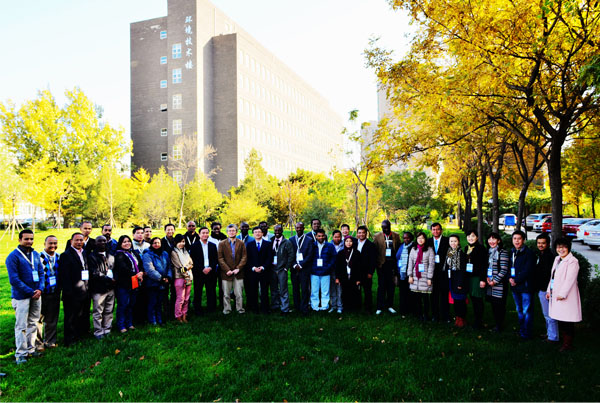2013 Water Quality and Sanitation Training Program
"2013 Water Quality and Sanitation Training Program" has closed successfully at Nov 15, 2013. This training program is organized by Research Center for Eco-Environmental Sciences (RCEES), Chinese Academy Sciences (CAS) and CAS-TWAS Centre of Excellence for Water and Environment (CAS-TWAS CEWE). Totally, 25 participants who were working in local water service companies or water manage government, from 17 developing countries included India, Malaysia, Vietnam, Cambodia, Mogollon, Nigeria, Indonesia, Laos, Thailand, Philippine and Malawi etc attended this training program during Nov 04 - Nov15, 2013. Participants were introduced to deliver lectures related with the situation of water quality and sanitation in their home countries and share their experiences with the other participants, in coping with the water quality and sanitation from detection, monitoring and managing the risk.
This training program is to culture the experts in the water and environmental field, to transfer technologies and successful experiences accumulated in China to the other developing countries, and to make the contributions to improve their environment quality and sanitary conditions. 4 different workshop modules were designed during the training program, south to south cooperation, arsenic removal technologies, environmental protection equipment and conversation with china water service companies. We also Organized all participants and RCEES students to visit water and wastewater treatment plant, pharmaceutical factory and arsenic removal project site and china Yixing industrial park for environmental science and technology.
However, although all countries have made great effective efforts improving water quality and sanitation. They are still confronting with many challenges to contaminants in water. Especially for the developing countries, due to the insufficient innovative research capability, and the lack of capacity to detect, monitor and predict the pollution and to manage the risk related with water quality and sanitation, they are much more vulnerable to those events.
At the closing ceremony, all participants and lecturers were singing and dancing to celebrate. The participants expressed the honor of this training program, and the willing to foster the sustainable development with developing countries. We are particularly grateful to international water association and water-industry market for their timely help and support.

Copyright © 2013 - Shegy - All bung mi 京ICP备05002858号-10





